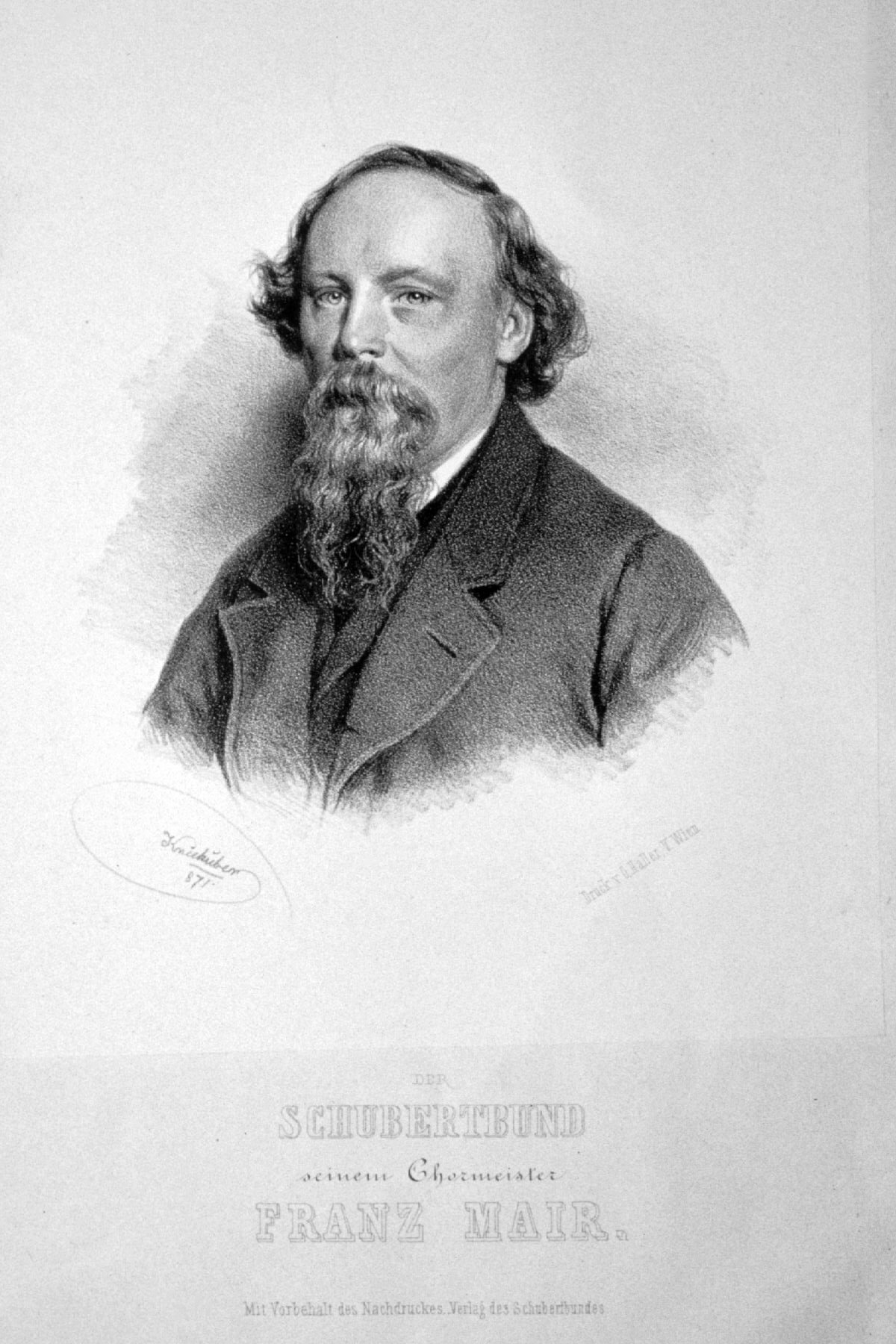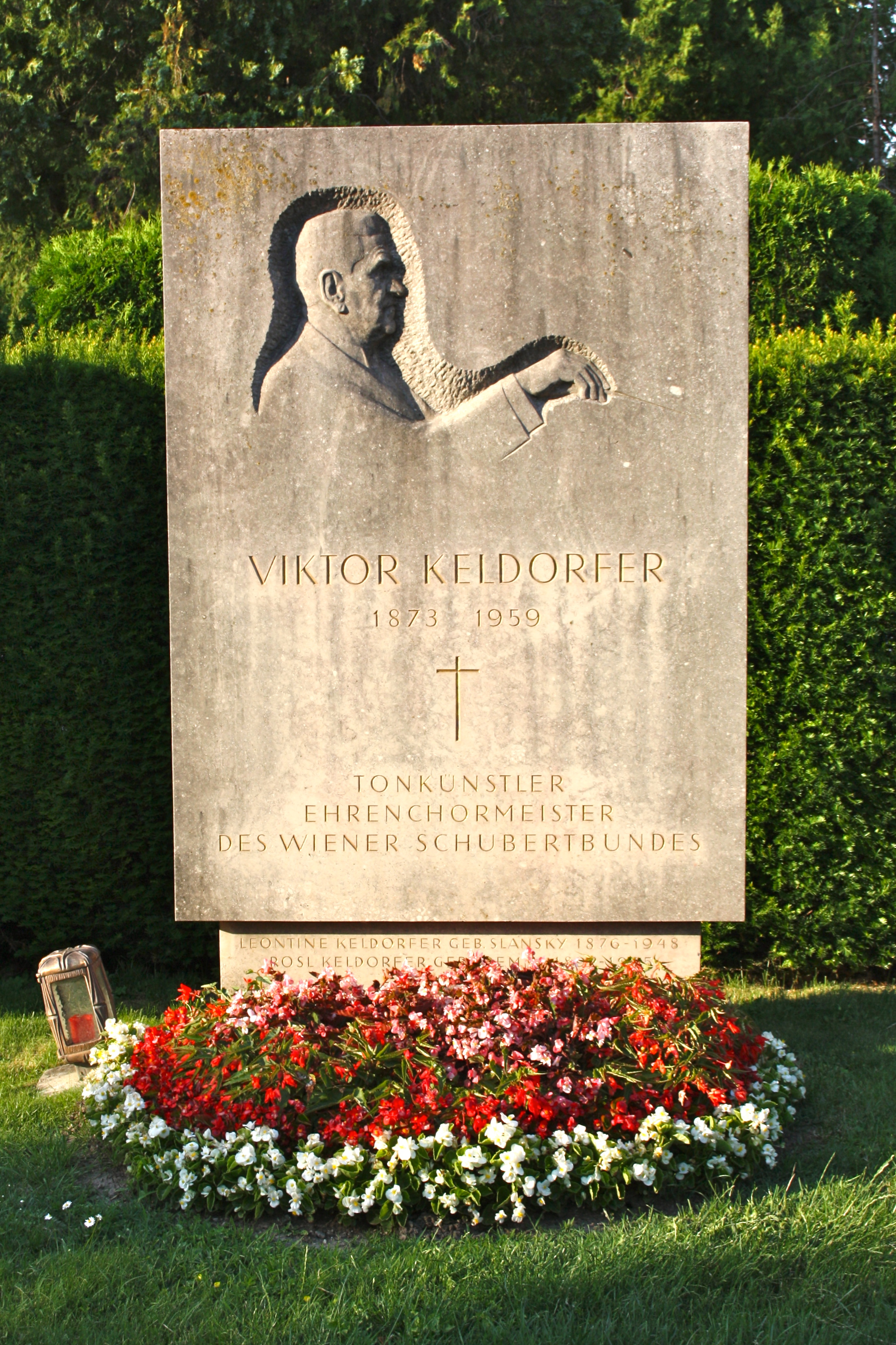|
Wiener Schubertbund
The Wiener Schubertbund ("Vienna Schubert Society") is a men's choir in Vienna, Austria, founded in 1863. History The choir's founder in 1863, and its first musical director, was Franz Mair. It was originally affiliated to a teachers' association, and known as the ''Lehrersängerchor Schubertbund''. The reference to Franz Schubert was significant in that Schubert was from a family of teachers, himself having been at one time a teacher. In 1870 the choir left the teachers' association, and was renamed ''Schubertbund''. Since 1918 the choir has been based in the Vienna Concert Hall, and it has had the name ''Wiener Schubertbund'' since 1922."Schubertbund, Wiener (WSB)" Österriechisches Musiklexikon Online. Retrieved 11 December 2019. [...More Info...] [...Related Items...] OR: [Wikipedia] [Google] [Baidu] |
Franz Mair Litho
{{disambiguation ...
Franz may refer to: People * Franz (given name) * Franz (surname) Places * Franz (crater), a lunar crater * Franz, Ontario, a railway junction and unorganized town in Canada * Franz Lake, in the state of Washington, United States – see Franz Lake National Wildlife Refuge Businesses * Franz Deuticke, a scientific publishing company based in Vienna, Austria * Franz Family Bakeries, a food processing company in Portland, Oregon * Franz-porcelains, a Taiwanese brand of pottery based in San Francisco Other uses * ''Franz'' (film), a 1971 Belgian film * Franz Lisp, a dialect of the Lisp programming language See also * Frantz (other) * Franzen (other) * Frantzen (other) Frantzen or Frantzén is a surname. It may refer to: * Allen Frantzen (born 1947/48), American medievalist * Björn Frantzén (born 1977), Swedish chef and owner of the Frantzén restaurant * Jean-Pierre Frantzen (1890–1957), Luxembourgian gym ... [...More Info...] [...Related Items...] OR: [Wikipedia] [Google] [Baidu] |
Franz Lehár
Franz Lehár ( ; hu, Lehár Ferenc ; 30 April 1870 – 24 October 1948) was an Austro-Hungarian composer. He is mainly known for his operettas, of which the most successful and best known is ''The Merry Widow'' (''Die lustige Witwe''). Life and career Lehár was born in the northern part of Komárom, Kingdom of Hungary (now Komárno, Slovakia), the eldest son of Franz Lehár (senior) (1838–1898), an Austrian bandmaster in the Infantry Regiment No. 50 of the Austro-Hungarian Army and Christine Neubrandt (1849–1906), a Hungarian woman from a family of German descent. He grew up speaking only Hungarian until the age of 12. Later he put an acute accent above the "a" of his father's surname "Lehár" to indicate the vowel in the corresponding Hungarian orthography. While his younger brother Anton entered cadet school in Vienna to become a professional officer, Franz studied violin at the Prague Conservatory, where his violin teacher was Antonín Bennewitz, but was ad ... [...More Info...] [...Related Items...] OR: [Wikipedia] [Google] [Baidu] |
Austrian Choirs
Austrian may refer to: * Austrians, someone from Austria or of Austrian descent ** Someone who is considered an Austrian citizen, see Austrian nationality law * Austrian German dialect * Something associated with the country Austria, for example: ** Austria-Hungary ** Austrian Airlines (AUA) ** Austrian cuisine ** Austrian Empire ** Austrian monarchy ** Austrian German (language/dialects) ** Austrian literature ** Austrian nationality law ** Austrian Service Abroad ** Music of Austria **Austrian School, Austrian School of Economics * Economists of the Austrian school of economic thought * The Pirc Defence, Austrian Attack, Austrian Attack variation of the Pirc Defence chess opening. See also * * * Austria (other) * Australian (other) * L'Autrichienne (other) {{disambig Language and nationality disambiguation pages ... [...More Info...] [...Related Items...] OR: [Wikipedia] [Google] [Baidu] |
Heinrich Gattermeyer
Heinrich Gattermeyer (9 July 1923 – 5 July 2018) was an Austrian composer and music educator.Uwe Harten, Art. „Gattermeyer, Heinrich“, in ''Oesterreichisches Musiklexikon'' online, retrieved 6 August 2021(https://www.musiklexikon.ac.at/ml/musik_G/Gattermeyer_Heinrich.xml). Life Born in Sierning, Gattermeyer, son of the local poet Karl Gattermeyer, graduated in 1941 at the and was subsequently drafted for military service. After the war, he studied piano with Bruno Seidlhofer, Choral conducting and conducting with Ferdinand Grossmann, as well as composition with Alfred Uhl at the University of Music and Performing Arts Vienna from 1945 to 1950.mica (update date: 28 April 2020): "Biografie Heinrich Gattermeyer". In Musikdatenbank von mica - music austria. Available online at: https://db.musicaustria.at/node/54304 (retrieved 6 August 2021). He also completed studies in German at the University of Vienna, graduating in 1948/49 with a teaching certificate. Initially Gattermey ... [...More Info...] [...Related Items...] OR: [Wikipedia] [Google] [Baidu] |
Hans Gillesberger
Hans Gillesberger (29 November 1909 – 4 March 1986) was an Austrian choir director. He directed the Vienna Boys' Choir from 1942 to 1945, then becoming deputy director for the Vienna State Opera. He also taught at the University of Music and Performing Arts, Vienna The University of Music and Performing Arts Vienna (german: link=no, Universität für Musik und darstellende Kunst Wien, abbreviated MDW) is an Austrian university located in Vienna, established in 1817. With a student body of over three thousa .... He returned to the Vienna Boys' Choir as artistic director in 1965. He has been called "one of the most important choral conductors of the postwar period". References {{DEFAULTSORT:Gillesberger, Hans 1909 births 1986 deaths Austrian choral conductors Male conductors (music) Vienna State Opera Academic staff of the University of Music and Performing Arts Vienna 20th-century Austrian conductors (music) 20th-century Austrian male musicians ... [...More Info...] [...Related Items...] OR: [Wikipedia] [Google] [Baidu] |
Viktor Keldorfer
Viktor Josef Keldorfer (14 April 1873 – 28 January 1959) was an Austrian conductor of male voice choirs, in particular from 1922 to 1954 of the ''Wiener Schubertbund'', and was a chairman of choir associations. Life Keldorfer was born in Salzburg in 1871, one of 21 children of Joseph Keldorfer, head of police supervision, and his wife Antonie, daughter of the painter . Viktor Keldorfer, like his brothers, sang as a boy in the choir of the Franciscan Church, Salzburg, of which his father is thought to have been a conductor. He later attended teacher training college and the Mozarteum University in Salzburg."Keldorfer, Familie"" ''Oesterreichisches Musiklexikon online''. Retrieved 15 May 2021. He moved to Vienna in 1892, where he was a primary school teacher, and in the following year joined the '' |
Anton Webern
Anton Friedrich Wilhelm von Webern (3 December 188315 September 1945), better known as Anton Webern (), was an Austrian composer and conductor whose music was among the most radical of its milieu in its sheer concision, even aphorism, and steadfast embrace of then novel atonal and twelve-tone techniques. With his mentor Arnold Schoenberg and his colleague Alban Berg, Webern was at the core of those within the broader circle of the Second Viennese School. Little known in the earlier part of his life, mostly as a student and follower of Schoenberg, but also as a peripatetic and often unhappy theater music director with a mixed reputation as an exacting conductor, Webern came to some prominence and increasingly high regard as a vocal coach, choirmaster, conductor, and teacher during Red Vienna. With Schoenberg away at the Prussian Academy of Arts (and with the benefit of a publication agreement secured through Universal Edition), Webern began writing music of increasing confidenc ... [...More Info...] [...Related Items...] OR: [Wikipedia] [Google] [Baidu] |
Ferdinand Rebay
Ferdinand Rebay (11 June 1880 – 6 November 1953) was an Austrian composer, music teacher, choir director, and pianist. Biography Early years His father, also named Ferdinand Rebay (1851–1914), was an Austrian singer, writer, and composer, and was partner with Adolf Robitschek in the Vienna publishing firm Rebay & Robitschek. In 1890, at the age of ten, young Ferdinand Rebay became a chorister at Heiligenkreuz Abbey, south of Vienna. Over the next five years he received a thorough musical education and became a solo alto. In 1901 he joined Joseph Hofmann’s piano class at the Vienna Conservatory (today’s Universität für Musik und darstellende Kunst). He then studied composition at the Vienna Conservatory (of the Society for the Friends of Music) with Robert Fuchs, and also studied with Josef Wöss and Eusebius Mandyczewski. In 1904 he concluded his studies, with his final academic work, Erlkönig, for large orchestra, which Fuchs labelled the finest work to ha ... [...More Info...] [...Related Items...] OR: [Wikipedia] [Google] [Baidu] |
Wilhelm Kienzl
Wilhelm Kienzl (17 January 1857 – 3 October 1941) was an Austrian composer. Biography Kienzl was born in the small, picturesque Upper Austrian town of Waizenkirchen. His family moved to the Styrian capital of Graz in 1860, where he studied the violin under Ignaz Uhl, piano under Johann Buwa, and composition from 1872 under the Chopin scholar Louis Stanislaus Mortier de Fontaine. From 1874, he studied composition under Wilhelm Mayer (also known as W.A. Rémy), music aesthetics under Eduard Hanslick and music history under Friedrich von Hausegger. He was subsequently sent to the music conservatorium at Prague University to study under Josef Krejci, the director of the conservatorium. After that he went to Leipzig Conservatory in 1877, then to Weimar to study under Liszt, before completing doctoral studies at the University of Vienna. While Kienzl was at Prague, Krejci took him to the Bayreuth Festival to hear the first performance of Wagner's Ring Cycle. It made a lastin ... [...More Info...] [...Related Items...] OR: [Wikipedia] [Google] [Baidu] |
Men's Choir
A men's chorus or male voice choir (MVC) (German: ''Männerchor''), is a choir consisting of men who sing with either a tenor or bass voice, and whose music is typically arranged into high and low tenors (1st and 2nd tenor), and high and low basses (1st and 2nd bass; or baritone and bass)—and shortened to the letters ''TTBB''. The term can also refer to a piece of music which is performed by such a choir. Overview Male voice choirs are commonly found in the United Kingdom, particularly in Wales, Cornwall, and Yorkshire. The names of male voice choirs sometimes use the abbreviation MVC, for example Castleford MVC. Men have sung together throughout history. In the West, most music lovers will be familiar with monastic chanting such as the Gregorian chant. In addition, men have come together to make music and enjoy the fellowship of others with a similar passion. Glee clubs became popular in the United States where men would sing in harmony, usually ''a cappella''. Russia has a ... [...More Info...] [...Related Items...] OR: [Wikipedia] [Google] [Baidu] |
Die Tageszeiten
''Die Tageszeiten'' (''Times of the Day'') is a choral composition written for male voice choir and orchestra by Richard Strauss (1864–1949), TrV 256, Op. 76 (published 1928). It consists of four movements: "The Morning", "Afternoon Peace", "The Evening" and "The Night". The lyrics are based on four poems of the same names by Joseph Eichendorff (1788–1857) from his collection ''Wanderlieder'' (Wanderers' songs). The work was premiered on 21 July 1928 with the Wiener Schubertbund (Vienna Schubert Society) and the Vienna Philharmonic as part of the Schubert centenary. Composition history On 1 May 1924, the male voice choir of the Wiener Schubertbund (Vienna Schubert Society) serenaded Strauss in honor of his sixtieth birthday outside his house on Mozart-Platz. The choirmaster, Viktor Keldorfer, took the opportunity to ask if Strauss might write a piece for the choir and suggested the poetry of Joseph Eichendorff as a possible text. Eichendorff was a very popular Romantic p ... [...More Info...] [...Related Items...] OR: [Wikipedia] [Google] [Baidu] |




